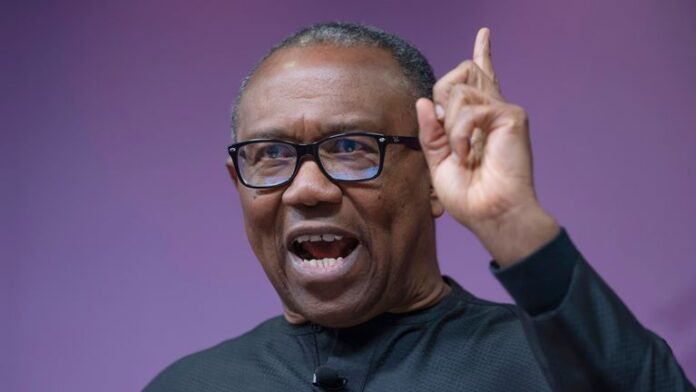Former Anambra State Governor and Labour Party presidential candidate in the 2023 general elections, Peter Obi, has raised alarm over the growing insecurity in the country, saying Nigeria is bleeding and needs urgent intervention.
Obi made the statement on Sunday via his official X (formerly Twitter) handle following another bloody weekend marked by violent attacks and mass killings across several parts of the country.
According to reports, eight operatives of the Nigerian Security and Civil Defence Corps (NSCDC) were ambushed and killed by gunmen in Edo State, while five soldiers and at least 58 civilians were feared dead following attacks by suspected insurgents in Borno State.
Reacting to the tragedies, Obi said these killings are clear evidence that Nigeria is already in the middle of a full-blown security crisis, calling on the Federal Government to immediately declare a state of emergency on insecurity.
“When over 100 Nigerians are killed in a single weekend, our casualty figures rival those of countries officially at war. This is no longer business as usual,” Obi wrote.
“It is time to declare a national war on insecurity — to mobilise every resource, every agency, every state, and to suspend all distractions while we begin the process of reclaiming our nation from lawlessness,” he added.
Obi expressed deep condolences to the families of the victims and urged security agencies to urgently fish out the attackers and ensure they face justice. He noted that beyond sympathy, the country needs action and strong leadership to stop the wave of bloodshed.
“These losses are not just numbers. They are fellow citizens, family members, breadwinners, and dreams cut short,” Obi wrote. “We cannot continue to count the dead while doing nothing.”
Nigeria has been battling insecurity on multiple fronts for over a decade. In the northeast, Boko Haram and its splinter groups continue to carry out deadly attacks on villages, military formations, and civilians. In the northwest and north-central regions, bandits operate with little resistance, engaging in mass kidnappings, killings, and extortion. In the southeast, gunmen have attacked police stations and government offices, adding to the general sense of fear across the country.
Despite increased military deployments and security spending, the number of lives lost continues to rise, with many Nigerians feeling unprotected.
Just last month, the Global Terrorism Index ranked Nigeria among the top countries most affected by terrorism, while human rights groups have documented thousands of deaths from violence in the past year alone.
Peter Obi’s statement adds to a growing chorus of voices urging the Federal Government to act decisively on the security situation. Civil society organisations, religious leaders, and regional groups have all called for a more coordinated and urgent response from the government.
Some have proposed a national security summit, while others are pushing for community policing, state police, and more investment in intelligence gathering and technology.
However, Obi’s demand for a state of emergency reflects the belief that the situation has gone beyond the usual responses and now requires extraordinary measures.
As Nigerians continue to mourn the latest victims, pressure is mounting on President Bola Tinubu’s administration to prioritise security and restore public confidence.
So far, the Presidency and relevant security agencies have yet to issue detailed responses to the specific attacks in Edo and Borno states.

